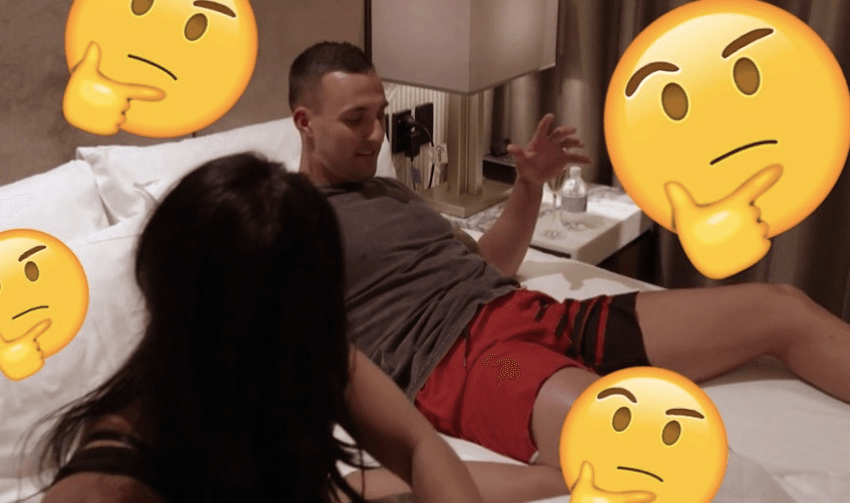Alex Casey rips open the velcro on Married at First Sight Australia‘s biggest scandal yet.
There’s a lot to be said about the latest sordid season of Married at First Sight Australia. For a start, there’s the slimy cheating scandals, the violent outbursts of rage and the relentlessly sexist gaslighting. And then there’s the very naughty swearing, the petition to fire one of the experts following the naughty swearing, and the rampant rumours that half of them are actors.
But the biggest shocker of all? The bed boardies.
The horror began on the night of Nic and Cyrell’s wedding in what feels like 40,000 years ago in the Iron Age of early February 2019. It had been a tense wedding, complete with a brother-in-law so furious that one of his blood vessels had burst. Everyone was tired, everyone was looking forward to shedding their glad rags and hitting the hay. And what better for a comfortable night’s sleep than a rigid pair of bright red boardies?
As Nic attempted to coyly slip into bed, Cyrell whipped back the duvet while chanting “take it off, take it off, do a dance, do a dance” and then rapped on Nic’s boardies bum like a drum. “Lucky I’ve got my pants on,” said Nic. Pants indeed. Short pants. With velcro on. Quick-drying. Nylon. Mostly for swimming. Nic wasn’t the only one diving into the sea of love with his Quicksilvers in tow. Allow me to introduce Dude Dino and Billabong Billy.
It’s a sartorial choice that has sparked a fierce amount of debate, both on our reality TV podcast The Real Pod and presumably in town squares across the country. Is it to hold down their boners? Is it because they forgot their pyjamas? Is it because they been spendin’ most their lives living in a Surfer’s Paradise? And don’t even get me started on Mark, who went full Winnie the Pooh in this disturbing bottomless ensemble.
Intrigued, perturbed and confused, I reached out to previous Married at First Sight NZ grooms to see what they made of the beachy nighttime garb. I was initially met with shock and disgust. “Blergh!” responded Ben Blackwell from MAFSNZ season one. “Forget wearing them to bed, why are they wearing them after 2005?” Friend and fellow MAFSNZ contestant Sam Levi voiced a similar disdain for the light-weight shorts. “From the fashion side I don’t find it attractive at all – it’s very lazy.”
My panel of experts provided several different theories as to why their Aussie counterparts had “boarded up” so dramatically. The first was purely anatomical. “With cameras roving around there would be nothing more embarrassing than waking up tackle out on national TV,” said Dave McClelland from last year’s season of MAFSNZ. “After the deed has been done [and] a looming morning of cameras await, it’s easier to find some board shorts than skimpy undies.”
Wayne McIntosh from the same season put it more succinctly: “I’d say it’s probably a substitute for boxers as you could possibly slip a nut out the bottom.”
Beyond scrotal decency, some contestants suggested the boardshorts could be protecting the wearer not from what’s within, but what’s outside. “If you’re really not into your partner, or you just don’t want that physical contact yet, you have to send out all possible signals of ‘no thank you’,” said Blackwell. “Trackies and hoodies were my go to, which are not my normal sleeping attire.” McIntosh, who endured a similarly incompatible relationship, also slept fully clothed.
“It’s just for the cameras and viewers at home,” posited Levi. “They will get back out of bed once the crew leave and go back to their normal routine when the cameras aren’t rolling. Think of it this way, why would you go to bed with cameras all around you?” It was an interesting theory which appeared to suggest that reality television might not be as organic as we’d been led to believe. I needed to consult an oracle, a wizard, a reality TV shaman.
I needed Nasser.
“I’m the voice of reason on this show” boomed Nasser Sultan, the breakout star of MAFSAU last year after he cleaned his kitchen in his underpants and was later photographed bringing in the bin, also in his underpants. “I know the reason for everyone wearing board shorts on the show. If you don’t like the person you’re with, you’re not going to get naked, you know? I’d say the reason the men are wearing shorts is to guarantee they aren’t having sex.”
Like Levi, Sultan revealed some startling truths about MAFS production. “They film ‘wake-ups’ the next day, where you have to lie in bed and pretend that the cameras aren’t there. They can happen at any time – it could be 2pm and they pull the blinds and film for 10 minutes and pretend it’s night. It’s all bullshit. So they wouldn’t have slept in the boardshorts, it will just be production bowling in midday and saying ‘we need to do a wake-up, can you pop something on and hop into bed’.” Voila: bed boardies.
Despite his wisdom on the topic, Nasser never boarded the boardie train during his time on MAFSAU. He says his devotion to the boxer brief was too strong, particularly when housework is on the agenda. “That’s just how I do it at my house. I did the vacuuming in them just yesterday, too. I just feel so much freedom when I’m in my underwear.” He has no regrets about his leisurewear choices on his season of MAFSAU, but would like to make the record clear about the colour range.
“I’ve advanced since then and bought some new pairs, so it’s not just the grey pair anymore – I’ve moved up to black and navy.”
Nine declined to comment on the role of boardshorts in their production



